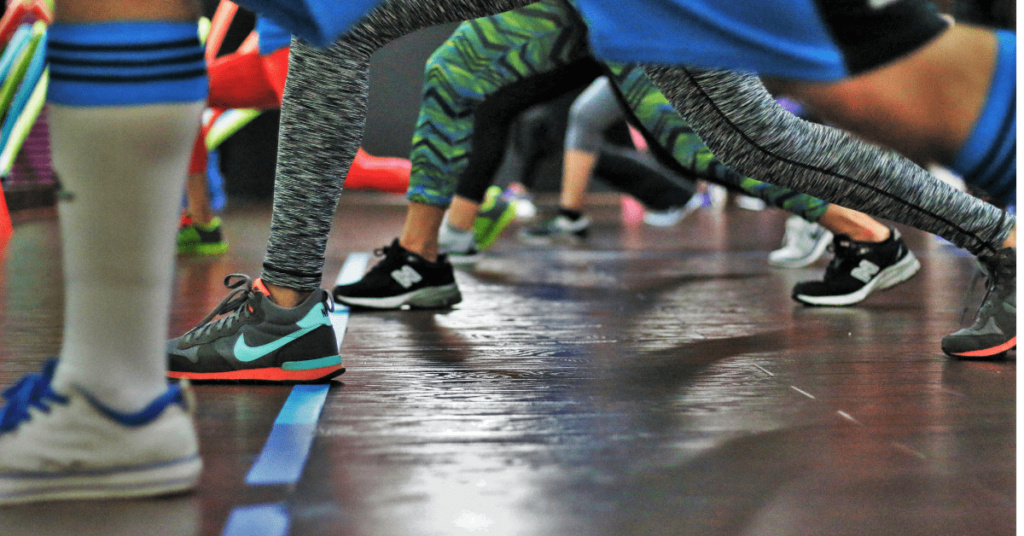As the years go by, boutique fitness studios are becoming increasingly popular, with a prediction that by the end of 2022, they will be worth $22.1 billion across the world.
For those already in the fitness scene or aspiring to be, this can be a lucrative and enticing avenue to launch into.
In addition to this, it allows you to raise a community of like minded fitness individuals that match the passion and ethos of your fitness boutique.
Plus, once you have the knowledge, resources, and the right business model, it’s pretty easy to set up a fitness boutique.
To know exactly what a fitness boutique holds, its benefits, and what to consider, keep on reading below.
Skip ahead to:
- What is a boutique fitness studio?
- Benefits of a boutique fitness studio
- How to start a boutique fitness studio in 2022
What is a boutique fitness studio?
Unlike large scale gyms, boutique studios simply focus on a specific type of exercise or a couple in a like-minded environment.
As it has a strict focus on a specific exercise or fitness, the instructors tend to be highly qualified than a standard commercial gym.
Often these studios are given the name of small gyms that tend to be between 800-3500 square feet.
Moreover, a boutique fitness studio offers an exclusive experience as the spots tend to be limited, and reservations are normally required in advance. In comparison to some gyms, these studios have cancellation or no-show fees.
Benefits of a boutique fitness studio
There are a lot of advantages for both you as the gym owner and members if you plan on opening a boutique fitness studio which are:
Builds a community
Like we mentioned earlier, boutique fitness tends to only cater to one type of fitness or at most two. Unlike generic gyms, this specific idea often attracts fitness goers who are interested in that exercise only or want to just focus on that.
Unlike commercial gyms, where many members hop from class to class, these boutique members want to do and get better at that specific exercise. Due to this, many members can socialize and make friends with one another due to their shared interests and common goals.
Combine this with a highly qualified specialized instructor, and you have a group of dedicated individuals who want to show up each time.
Profitable
If you’re on top of your finances, marketing and have a strong knowledge of business, opening and running a boutique studio could be incredibly lucrative. After all, many successful boutique studios can easily make a profit within 6-18 months of opening.
In addition to paying for classes, you also have the right to charge for last minute cancellations and locker fees. But, before you jump into running it, you have to think about the quality of your services, location, messaging, prices, and marketing.
Members get individual attention
In comparison to commercial gyms, boutique studios are a lot more intimate. Small group classes hosted in a boutique studio allow the instructors enough time to go around and start checking people’s forms, motivating them, and words of encouragement not to give up. Plus, due to the more attention members receive, they will likely see results quicker than in the gym.
Less costly to set up than a gym
As boutique studios are a lot smaller than a commercial gym, it will cost you less to build and rent, all depending on the location. In addition to this, there’s less equipment required, and you won’t need to hire more staff for maintenance.
Hygienic
Compared to neighborhood gyms, boutique fitness studios can be a lot cleaner. This is because there’s less equipment that needs to be wiped down constantly, fewer people entering and leaving.
Plus, as it’s a smaller space, dirt can show up a lot more easily, so it’s more motivating to keep it clean. Also, due to the pandemic, it can help your members feel more confident knowing your space is clean and being able to implement proper social distancing.
More accountability
As boutique fitness studios are a lot more personal, it’s less likely their members will fall between the cracks. We mean by this, there are so many factors to keep them accountable to keep showing up and making the sessions count.
First of all, there are charges for not showing up or cancellations on short notice. Secondly, in most boutiques, the instructors tend to know the clients much more personally, allowing them to find them and hunt them down on social media if they’re a no show. Therefore these accountability factors can help contribute to membership retention.
A positive ego-free environment
Many experienced members might be helpful in gyms but come across as intimidating towards first time clients. Similarly, people may feel anxious in a crowded gym and avoid working out properly.
The Customer
Engagement Playbook
for Your Fitness
Business
Discover more On the contrary, many people work out with a common interest and similar goal, creating a shared sense of purpose with a boutique studio. This mutual motivation helps members encourage one another, building them up towards their fitness goals instead of putting them down.
Efficiency
Members don’t have to spend a lot of time weighing to use certain equipment or modify their workout until the equipment is free. Instead, with boutique fitness studios, members can know exactly how long a session lasts or how long they use a piece of equipment, as they will have to book ahead in advance on an app or website. This booking process alone increases efficiency, organization and increases client satisfaction.
How to start a boutique fitness studio in 2022
If opening a boutique fitness studio sounds like something you’d be interested in, then you should consider the following before opening one:
1. Decide on the location of studio
If you’re a startup, selecting your location can significantly impact your costs to launch the studio, and it can also later influence your operating costs. While some boutique studios tend to make higher profits quicker, many struggle with expensive rents to run them.
Plus, for a niche business like this, location is everything. To attract potential members to visit your studio, you need to be based in a central location with a lot of traffic. These locations often tend to be cities with a lot of millennials in them.
2. Consider the exercise
Alongside choosing the right location, you will want to hone in on one specific type of fitness or exercise you’re going to specialize in. Think about the type of workout you want to offer like indoor cycling, hiit, reformer, total body workouts or cardio, barre, pilates, strength training, personal training, or group training.
Remember though; whatever you choose, if you’re offering multiple types of fitness, it’s going to be difficult to attract many people with the same interest, stopping your tribe from being formed. When choosing the exercise, take time out to think about what you’re experienced in, what’s popular, and if the space you have can accommodate the exercise.
3. Have a strong business plan
To succeed as a boutique fitness studio, you have to have a solid business plan. An efficient business plan will help your company have a sense of direction and allow you to stick to set rules. In addition to this, it will also help you to reflect on your competition, marketing strategy and know your demographic in greater detail.
4. Get training
Across all of the team in the boutique studio, you will want to make sure everyone is well trained, including you. Ideally, you will want to ensure that everyone is trained to the same level and experienced doing multiple roles and interactions.
For example, you will want to make sure everyone is trained well in promotion, address complaints, basic admin, and more. This universal training will allow staff members to step in and do multiple roles if one becomes sick or unwell.
5. Invest in equipment
If you’re opening a studio where people are willing to pay premium prices to get the results they need, then you have to invest in premium equipment. For example, if you want to open a cycling studio, you could expect to pay anything between $800-$1000 per bike in your boutique gym.
When buying equipment and machinery for your studio, you will not want to cut corners as it could affect your brand’s reputation. You will want your workout experience to be superior to the one offered by your neighborhood gym.
6. Gain permits and insurance
Before operating your fitness studio, you must get the essential permits and insurance to save you from being fined or sued. The type of permits you should think about getting are:
State & Local business
Your state and local council may require you to have specific permits to operate your boutique fitness studio. Therefore based on where you’re located, seek the advice of local councils to know more of what’s required.
Liability waiver
As a fitness entrepreneur, the last thing you want to do is be sued by your clients. Therefore you must have a liability waiver that your clients can sign to limit your legal liability. Such agreements cover you against clients injuries from dangerous equipment and physical exertion.
Certificate of occupancy
Brick and mortar businesses in today’s world often have to show that they have a certificate of occupancy. This is a certificate given by a third party that shows you’ve met all the building codes, local laws, and government regulations.
7. Generating attraction and class sales before the studio is open
Many new entrepreneurs in the fitness industry often make a rookie error waiting for their studio to open before selling slots for their studio and marketing it. To help keep you organized and top of your business, you will want to start getting sign-ups while you are in the middle of setting up your studio.
Knowing how many sign-ups or class bookings you have can allow you to calculate some overheads slowly. In addition to this, another advantage is you can start getting people to market your business through word of mouth, so by the time you open; you have some interest.
8. Efficient marketing
You can’t just depend on having an exclusive boutique for your studio to succeed—half of the hard work that is required all lies in your marketing techniques. While word of mouth is good, you will also want to gain attraction through social media.
Try considering targeted Facebook and Instagram ads to those in your area. These two are good because it helps streamline the analytics from both platforms together into one.
In summary
Overall, boutique fitness studios are becoming more popular than ever due to people’s increased passion for health and fitness. Part of their popularity is down to studios being filled with positive vibes for new gym-goers and people who are anxious about attending gyms.
Moreover, the personalized experience members get from studio sessions allows them to gain the proper knowledge, form, technique, and notice results quicker than in a commercial gym. Therefore the positive atmosphere and results driven sessions boutique fitness studios hold alone can make it a lucrative avenue for any fitness entrepreneur.















